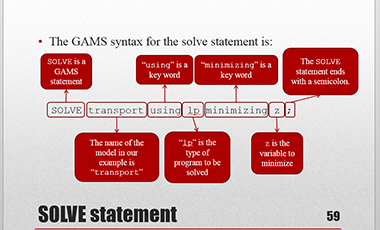Economic models can be used to conduct research on a wide range of topics and help analyze policies pertaining to agricultural growth, poverty, climate change, and natural resource management, to name a few. Libraries of models are widely available at research institutions and via professional organizations but, without knowledge of the coding language used to operate modeling software, such libraries might as well be in a storeroom under lock and key.
The African Growth & Development Modeling Consortium (AGRODEP) is offering an online key to that lock: a comprehensive, bilingual training toolbox for General Algebraic Modeling System (GAMS), the most commonly-used programming language for economic modeling.
AGRODEP is an IFPRI-led capacity building initiative, aimed at positioning African experts to take a leadership role in the study of strategic development questions and the broader agricultural growth and policy debate facing African countries. While AGRODEP’s focus is on capacity building in Africa specifically, the GAMS Training Toolbox is accessible to everyone free of charge.
“The AGRODEP GAMS Training Toolbox aims to enable researchers to utilize various modeling frameworks such as CGE [computable general equilibrium], partial equilibrium, linear programing and others,” says Simla Tokgoz, a senior researcher in the Markets, Trade and Institutions Division at IFPRI and program coordinator for this project. “This is capacity building in the short run and the long run, as models are used to analyze different policy options, which in turn helps policymakers develop the best policies for their countries.”
Over the course of 10 video lessons, with slides in English and voiceovers available in English or French, viewers gradually learn the GAMS language, from the basic installation instructions to the more sophisticated GAMS syntax and programming techniques. The training concludes with an introduction to economic modeling.
Additionally, lectures are accompanied by hands-on exercises featuring sample code in order to provide users with a deeper understanding of the material. Users are then expected to complete the “homework” after each video by running the corresponding short GAMS program error-free.
“We encourage institutions to promote its availability among their own networks as well in order to maximize this tool’s capacity building potential,” says Tokgoz.
The Training Toolbox was designed by Antoine Bouet and David Laborde, senior research fellows in the Markets, Trade and Institutions Division, and developed in collaboration with macroeconomic modeler and economic analyst Véronique Robichaud using the tools provided by the GAMS Corporation (developers and producers of the software).
“It explains very well in detail– instead of just looking in a manual, [the GAMS Training Toolbox] takes you to the important things and explains the steps to follow,” says Valeria Pineiro, a research coordinator at IFPRI who teaches courses on modeling in Peru. “Sometimes it is easier to write code if someone explains to you the important things, and that is what they explain in these videos.”







